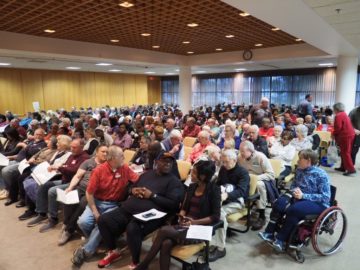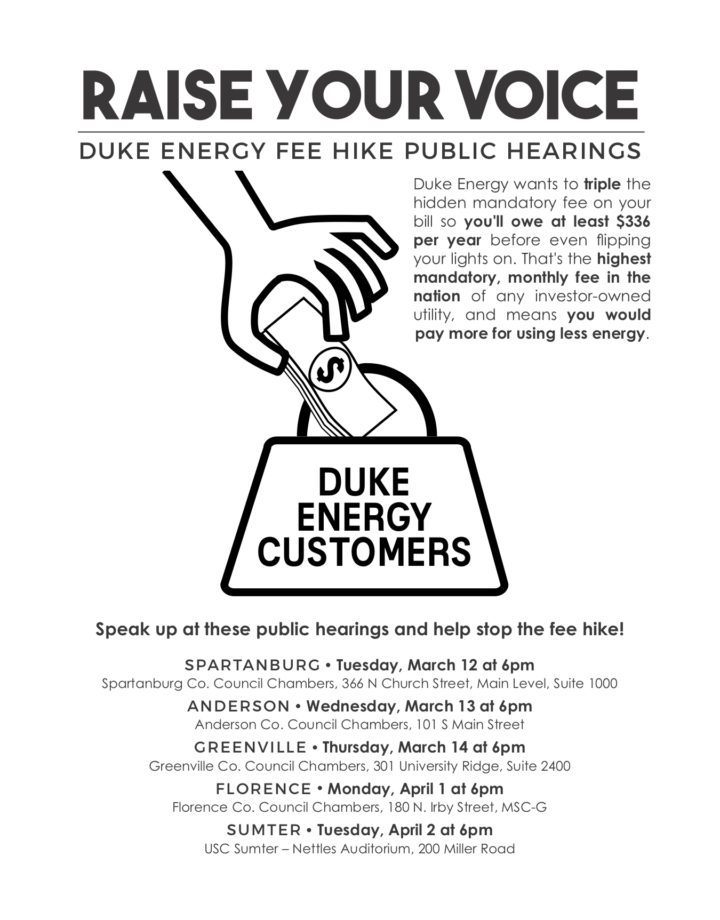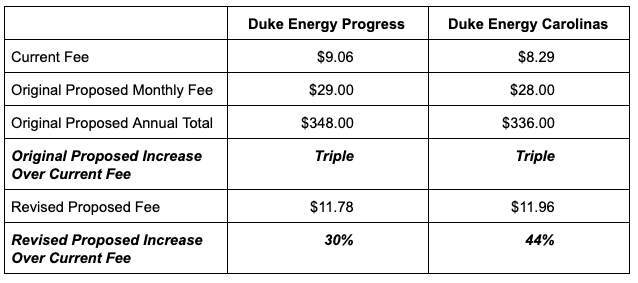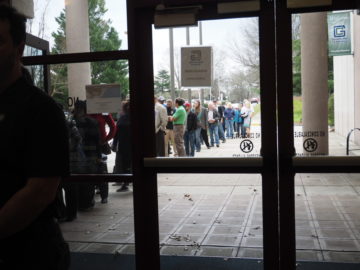
The South Carolina Public Service Commission (PSC) issued its conclusions for Duke Energy’s proposed fee hike this week, which amounted to a victory for customers. Though the Commission’s order is not perfect, customers’ participation ultimately led to very positive outcomes.
The fee hike initially proposed by Duke was to more than triple the current monthly fee that South Carolina customers must pay before using any electricity–from $8-9 per month to $28-29 per month. This would have meant that customers would pay at least $336 per year before even flipping on a light switch, and if it were approved, it would have been the highest mandatory monthly fee of any investor-owned utility (IOU) in the nation. See our blog post on the proposal here.
The problem with hiking the mandatory monthly fee is that as proportionally more of the utility bill is put into the mandatory fee rather than the amount charged for actual electricity (kilowatt hours) used, it takes away customers’ ability to control their energy bills, disincentivizes energy conservation, and most heavily harms low energy users–namely seniors, renters, low-income families, and solar households. Customers recognized these problems with the fee hike immediately and responded in force by alerting the PSC Commissioners, which must approve rate hikes for regulated utilities like Duke, to their concerns.

SACE and partner groups began a campaign to raise awareness among customers about the egregious fee hike and ensure they were able to voice their opposition in written comments and at public hearings. And did they ever voice their opposition! More than 1,100 Duke customers submitted written comments to the PSC opposing the fee hike! Read some of the customers’ comments that we helped deliver in the blog series here.
South Carolina AARP requested five public hearings throughout Duke’s service territories, which the PSC granted. The hearings took place in Spartanburg, Anderson, Greenville, Florence, and Sumter, nearly all of which turned out to be beyond-capacity crowds (more than 1,000 customers total), with dozens of customers articulately explaining how the proposed fee hike would have done harm. The primary themes that came out in the customers’ testimony were: 1) hiking the mandatory monthly fee would have a terrible impact on low-income and fixed income customers 2) hiking the mandatory monthly fee would unfairly punish customers who reduce their energy use through energy efficiency or solar; 3) customers suffer while Duke shareholders profit and executives enjoy lavish compensation, and 4) [at the Florence and Sumter hearings] that farmers would be negatively impacted by the fee hike. Read more about the public hearings and customers’ testimony in the blog post here.
 Under intense pressure, Duke Energy scaled back their proposed fees from $28-29 per month to $11.78 for Duke Energy Progress (DEP) customers and $11.96 for Duke Energy Carolinas (DEC) customers. These amounts were ultimately adopted by the PSC in their orders this week.
Under intense pressure, Duke Energy scaled back their proposed fees from $28-29 per month to $11.78 for Duke Energy Progress (DEP) customers and $11.96 for Duke Energy Carolinas (DEC) customers. These amounts were ultimately adopted by the PSC in their orders this week.
Did customer input make a difference? I cannot say “YES” enough! The PSC took its job seriously of listening to customers and incorporating their input into the final decision. Take for example their language from their orders, highlighted at the conclusion of this blog post, which specifically mentions the impact from customer testimony at the public hearings.
Duke Energy took its customers’ comments seriously as well. In the company’s letters announcing the downscaling of their proposed fees, Duke attributed much of the reason for the changes to “testimony heard at the public hearings” (DEC letter here; DEP letter here). Additionally, when justifying the appropriateness of the changes to the proposed fees, Duke Energy’s letters to the PSC cited the 1,000+ written customer comments to the PSC as justification for their change in the monthly fee (DEC letter here, DEP letter here).

The scaling back of the proposed monthly fees is a victory for customers and shows the power of public input in the decision-making process. However the Commission’s decisions are not totally good for consumers. Several experts participating in the rate case testified that the method by which Duke calculated the monthly charge to customers was inappropriate and assigned far too great of a cost on each customer, which resulted in the exorbitant proposed fees. While it is the standing policy of the PSC that customers’ monthly fee should only be comprised of the costs for checking the meter, billing, customer service, and providing a service drop from the distribution line, Duke’s proposed fee hike rests on the idea that customers also should be charged for an equal share of much of the equipment used to generate and deliver power to customers, regardless of how much power they actually use.
The fee that was settled upon for DEC territory of $11.96 is in line with the more accurate cost calculation method, but the DEP fee is still $2-3 higher than it should be, which means that Duke is charging customers more for basic access to electricity than it actually costs to provide that access (see our op-ed on this topic here). Moreover, the PSC did not explicitly reject the use of Duke’s flawed accounting method, which leaves customers vulnerable to similar outrageous fee hikes in the future. We and other advocates would have preferred that the Commission expressly reject Duke’s cost calculation method and limit the fee increase to the same percentage as the overall rate hike.
Nonetheless, the Commission’s decisions show that the power of public input made a massive difference and customers have a significantly better outcome than if they had not fought Duke’s outrageous proposal. Customers should be proud of the difference they have made in this fight and heartened that when they participate, their voices make an impact!
Excerpts from PSC orders, highlighting the impact of customers’ testimony at the public hearings:
Public hearings were held on March 12, 2019 in Spartanburg; March 13, 2019 in Anderson; and March 14, 2019 in Greenville. Hundreds of customers attended these hearings and spoke to the Commission about their concerns regarding the Company’s proposal. Many customers testified that they were struggling to pay their power bills under the rates currently in place and that they would not be able to afford an increase of the magnitude requested. A number of customers complained specifically of the high compensation of Duke Energy executives. […] the Commission finds, after having heard testimony involving myriad specific complaints at the public night hearings that the total compensation of Duke energy CEO Lynn Good is excessive and should not be borne by the ratepayers, that an additional 25 percent of Ms. Good’s compensation should be disallowed because during test year 2017, Ms. Good’s compensation represented the highest of any IOU’s CEO in the United States, totaling $21.4 million.” – PSC order on DEC rate case, pp. 8, 59-60
Public hearings were held on April 1, 2019 in Florence and on April 2, 2019 in Sumter. Hundreds of customers attended these hearings and spoke to the Commission about their concerns regarding the Company’s proposal. This Commission heard from about 45 customers who testified about the impacts of DEP’s requests in its Application […] At the Florence night hearing, approximately twenty-seven customers testified on various issues including the DEP proposed BFC rates. At the Sumter night hearing, approximately eighteen customers testified on similar issues. Public witnesses at the night hearings consistently testified that the BFC rates as proposed by DEP were too high. Among those testifying as to the harm that would be caused if the Commission granted DEP’s proposed BFC rate were several farmers and representatives of the agribusiness community. Several members of the agricultural community testified that the rate proposed on top of the current difficulties facing the farming community would have a negative impact on farmers, with some voicing specific concern over the impacts on farmers on the MGS rate. For example, Mr. Anthony Ward, a farmer, testified that with floods, hurricanes, and rainfall, accompanied by 133 percent rate increase for those meters that are attached to irrigation pivots, he cannot make it. Many others testified similarly […] Upon hearing the testimony from public witnesses at the night hearing, ORS modified its position regarding the BFC such that it supported a lower BFC for the medium-general service and Seasonal and Intermittent (“S&I”) customer classes, as well. According to witness Seaman-Huynh, following the night hearings held in Florence and Sumter, ORS received inquiries and calls from the agricultural community expressing concern over the requested increase. (R. p. 1096, ll. 7-10). Based on the testimony at the night hearings and these contacts, ORS supports the Farm Bureau’s request to limit the increase to medium general service (“MGS”) BFC to an increase similar to that of the small general service BFC – PSC order of DEP rate case, pp. 12-13, 62-63, 56